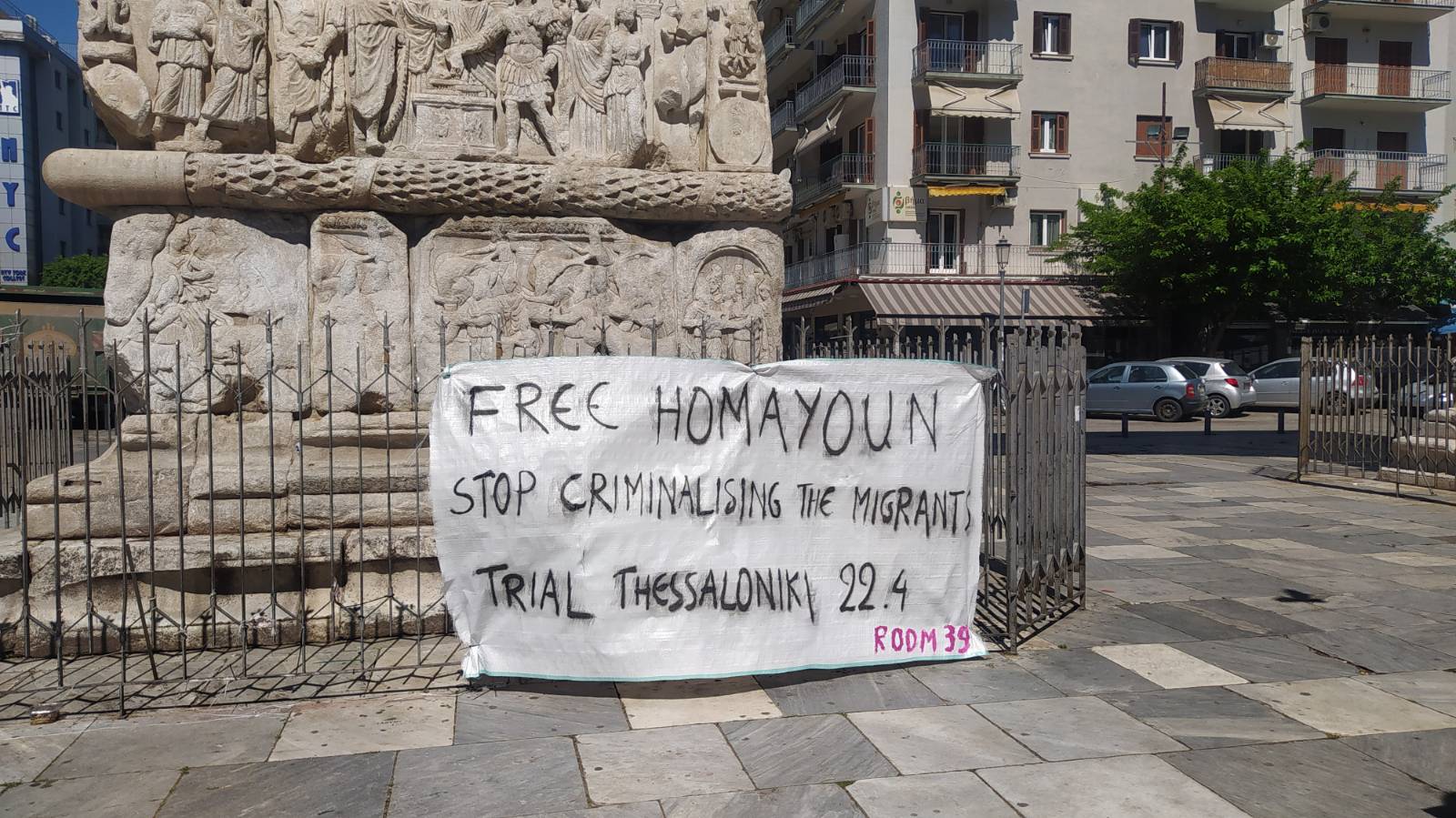Sixty-year-old Homayoun Sabetera recently spent his third summer in prison since his arrest in northern Greece in August 2021 on smuggling charges. Authorities apprehended Sabetera, who is originally from Iran, after he drove a car across the Greek-Turkish land border with seven people aboard. He says smugglers had coerced him into taking the wheel.
It has been two years since he was sentenced to 18 years in a Greek jail, in a trial campaigners say was unfair due to a number of issues, including a lack of proper translation.
Lawyers and his family have highlighted that Sabetera is yet another victim of what they describe as draconian anti-smuggling legislation that effectively targets asylum seekers rather than the real smugglers, who rarely make the dangerous crossborder journeys themselves.
On Sept. 24, Sabetera’s appeal trial will begin in Thessaloniki, Greece’s second largest city, and his loved ones hope it will end with his release from lockup.
“He Doesn’t Belong There”
Dimitris Choulis, who is on Sabetera’s legal team, spoke to Inkstick just after visiting his client in jail in early September. Speaking by phone from a cafe near the prison, Choulis says he’s optimistic that Sabetera would be released and reunited with his children, who are in Germany. “I see a person in prison who is not a criminal,” Choulis explains. “You can see so obviously he doesn’t belong there.”
Choulis adds, “He shouldn’t be accused of smuggling. People on the move shouldn’t be criminalized, but they are.” Although he hopes the court tosses out all the charges, Choulis argues that authorities should at least set him free, citing Sabetera’s history of cancer and a slate of health ailments.
“You can see so obviously he doesn’t belong there.” – Dimitris Choulis
Choulis, who is also part of the Samos-based Human Rights Legal Project, insists Sabetera’s case is just one of many examples of migrants facing smuggling accusations. He should know: His 10-case load in the next month testifies to the scale of the problem in Greece alone.
The problem, however, is increasing across the European Union, which is currently in the process of updating decades-old legislation. Ylva Johansson, the bloc’s Commissioner for Home Affairs, has said proposals for new legislation “will also allow for harsher penalties and a stricter definition of the crime of migrant smuggling.” Johansson added, “We are stepping up the fight against migrant smuggling and protecting people from falling into the hands of criminals.”
Still, the commissioner has also claimed that EU legislators are “going after the smugglers, not the smuggled.”
For his part, Greek Prime Minister Kyriakos Mitsotakis has called for a tougher approach. “Currently, it is the smugglers who decide who gets to enter the European Union, and this must change,” he said last September.
“Gross Human Rights Violations”
Meanwhile, campaigners insist that refugees and migrants continue to fall prey to legal loopholes that can land them behind bars.
Julia Winkler co-authored a 2023 report that looked into migrants who faced smuggling-related charges after authorities found them at the helm of a boat or behind the steering wheel of a car entering Greece. She tells Inkstick that it’s “quite clear” that the people authorities charge and accuse of smuggling “are migrants themselves and part of the group that just ended up steering the car [or] boat, or taking up some other roles.”
That report looked at 81 trials in Greece. It concluded that “arrests and preliminary investigations are riddled with gross human rights violations,” among them “arbitrary arrests, violence, and coercion, little to no access to interpretation or legal support as well as problems in accessing the asylum procedure during detention.”
Of the 81 cases the report examined, the average trial time spanned 37 minutes — the shortest lasted only six minutes. In more than two-thirds of all the documented cases, police or coast guard officers who provided crucial testimony against migrants did not appear in court for cross examination.
Winkler says the problem is not unique to Greece, and similar cases of migrants facing smuggling charges for taking the helm of a boat or a car’s steering wheel are cropping up across Europe. In Italy, for example, for every migrant boat that arrives, the authorities arrest at least one person on similar charges, she adds.
“We know that this is also happening in Spain and in the crossing between France and the UK, and it’s obvious that it’s also connected to the broader European legal framework,” Winkler explains.
“Repressive Migration Policy”
On the Greek island of Crete, an 18-year-old Egyptian, Ahmed*, is awaiting trial for smuggling charges. Ahmed and his father had been residing in Libya to earn enough money to make the journey to Europe, hoping to eventually reunite with Ahmed’s brother in the UK.
In November 2022, they joined a migrant boat bound for Italy. Ahmed was 16 at the time. After the boat washed up in Greek waters near Crete, the Greek Coast Guard towed it to land. Ahmed’s father, who was behind the helm at the time the coast guard stopped the boat, will now serve an eight-year sentence on smuggling charges.
Although witnesses say Ahmed had only handed out food and water on the boat, the teenager’s now also wrapped up in a legal battle over smuggling accusations. His lawyer, Maria Flouraki, says Greek courts interpret such laws “very broadly.”
“Even someone who distributes food or water can be accused of being a trafficker,” she adds. “The accused are often simple passengers who did not have money for the fares and therefore took on some work on the boat.”
Because the smugglers who receive money are typically not aboard the ships, they generally avoid arrest, Flouraki explains. Those convicted of smuggling make up “the second largest group by crime in Greek prisons,” she says, adding that 90% of them are foreign nationals.
In her view, Flouraki says, “the current legal framework and the way it is implemented does not combat illegal trafficking mainly constitutes a repressive migration policy.”
“Nothing Short of Torture”
Mahtab Sabetera, Homayoun’s daughter, now lives in Germany. She has been a passionate advocate for her father and has spearheaded the campaign for his release. She tells Inkstick that a delay of her father’s appeal trial from April to September had had devastating consequences on him.
“The court’s decision to postpone the trial is nothing short of torture ,” she says. “In the past month, Homayoun has collapsed multiple times in his cell and had to be taken to the hospital, yet there have been no further examinations.”
Mahtab adds, “His health is deteriorating. The prison doesn’t allow families to send medication, and the healthcare provided doesn’t even cover the basic medical needs of sick inmates. Honestly, every time my father calls, I’m just relieved he’s still alive.”
With his appeal approaching, she and others advocating for her father’s release have pinned their hopes on a positive outcome.
Still, she says she can’t understand how such legal mishaps happen in “the heart of Europe, supposedly in a democratic system.” The testimony of a single witness who wasn’t present in court helped secure her father’s original conviction. “I feel like I live in an autocratic state. If European countries truly upheld the rule of law, my father would have never been imprisoned.”
*Denotes a pseudonym for privacy.
Top photo: A photo of a banner calling for Homayoun’s release in Thessaloniki, Greece, in April 2024 (Courtesy of the Free Homayoun Campaign)














